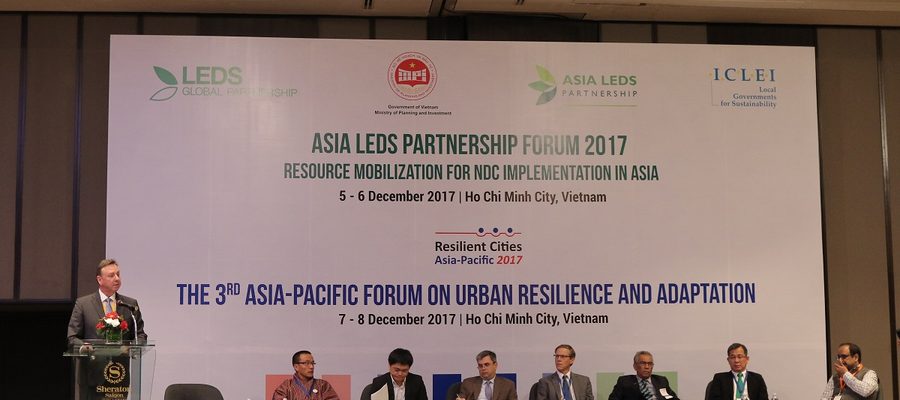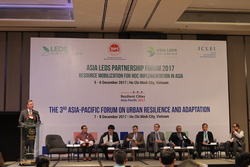BLOG: Sustainable development goals: a long way to go

By Tikender Panwar
The resilient cities Asia Pacific Congress (RCAP) and Asia LEDS Patnership Forum (ALP), jointly organised by the Ministry of Planning and Investment, Vietnam, ICLEI South Asia and Asia LEDs partnership, finished off successfully in Ho Chi Minh City in Vietnam in the first week of December. Why was it successful? There might be many reasons but the main one being a platform where a joint declaration could be passed where the National, Sub-National, and the city leadership along with the individuals including NGOs, private consultants et al came to a firm commitment of achieving the goals of COP21 .
As Gino Van Begin, Secretary General of ICLEI, whilst inaugurating the Congress talked about the recent COP23, which though has strong clouds of ambiguity of achieving the goals, said emphatically, that the process of change now is ‘unstoppable and irreversible’. The Congress dealt in breath about the resilient strategies being adopted by different nations and cities together to achieve not just the climate change goals but also the targets of Habitat III called the sustainable development goals (SDGs).
The Vietnamese were more explicit in mentioning their national perspective of integrating climate change, sustainability together and thus laying the path for development which is less carbon and more equitable. Soon we shall move on to the World Urban forum in February 2018 in Kuala Lumpur where, once again, at a larger scale review of our work in the cities and the tasks to achieve the target will be exhaustively done.
There are commitments and the nationally determined contributions (NDCs) of the national governments which speak profoundly about that. But the matrix drawn in real realm of development projects a scary picture which throws challenges that needs both rapid and long-term strategy planning.
A report has been released by the World Inequality Lab (WIL), an organisation that ‘aims to promote research on global inequality dynamics’. The WIL has a core mission to expand world wealth and data base. The report has given a scathing attack on the policy framework and has stated that economic inequality has increased rapidly in America, China, Russia and India.
In India, the report reveals that inequality has risen substantially since the 1980s following “profound transformations in an economy that centred on the implementation of deregulation and opening up reforms”. While placing the figure it states, “in 2014, the share of national income captured by India’s top 1% of earners was 22%, while the share of the top 10% of earners was around 56%. The top 0.1% of earners have continued to capture more growth than all those in the bottom 50% combined”.
Inequality varies to a great extent among countries even when they have similar levels of development and this highlights the important role of national policies in shaping the economy and inequality. For example, in China and India since 1980, the former recorded much higher growth rate with significantly lower inequality levels than India.
This is co-terminus to the SDGs as designed by the NDCs which lay the foundation for achieving these goals that include: , end poverty in all its form everywhere, end hunger achieve food security and improved nutrition and promote sustainable agriculture, ensure health lives and promote well being for all at all ages, ensure inclusive and equitable quality education and promote lifelong learning opportunities for all and then there are 17 such goals in all with the respective national government’s commitments to achieve that.
However, the WIL seriously poses challenges which do not emanate from the minds of individuals rather are based on solid data lying underneath. The report, however, has also mentioned some exceptions to the trend and that includes, Brazil, Middle East and Sub-Saharan Africa where the income inequality has remained relatively stable which once again shows the importance of policy level interventions by the national governments. There is another interesting feature of the report which speaks about the “dramatic decline in the net wealth of governments over the past decades and the challenges this poses for tackling inequality”.
This brings in the interesting integration in between policies and the democratisation of the entire process of governance which is so essential for the achievement of SDGs.
Tikender Panwar is the former Deputy Mayor of Shimla.
